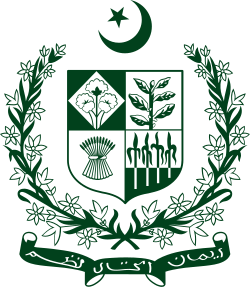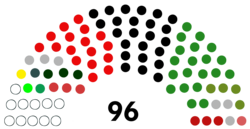| |||||||||||||||||||
217 of the 237 seats in the National Assembly 109 seats needed for a majority | |||||||||||||||||||
|---|---|---|---|---|---|---|---|---|---|---|---|---|---|---|---|---|---|---|---|
| Registered | 32,528,996 | ||||||||||||||||||
| Turnout | 53.70% ( | ||||||||||||||||||
| |||||||||||||||||||
 Results by constituency | |||||||||||||||||||
| |||||||||||||||||||
 |
|---|
General elections were held in Pakistan on 25 February 1985 to elect members of the National Assembly. [1] The elections were held under the military government of Muhammad Zia-ul-Haq after the restoration of the 1973 constitution.
Contents
Around 1,300 candidates contested the elections, which were held on a nonpartisan basis. [2] Each candidate was required to have their nomination paper signed by 50 registered voters from the constituency they wished to stand in. [3] In an attempt to disqualify a large number of opposition candidates and secure a conservative leadership, Zia-ul-Haq introduced amendments to the Political Parties Act of 1962. As a result, the Movement for the Restoration of Democracy (MRD), which was calling for an end to the military regime, boycotted the elections. [4]
Voter turnout was 54%. Most of the elected MNAs were supporters of the Zia regime. A new government was formed under the leadership of Muhammad Khan Junejo, a lesser known figure in national politics. Prime Minister Junejo and his followers subsequently established the pro-Zia conservative Pakistan Muslim League.



